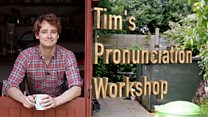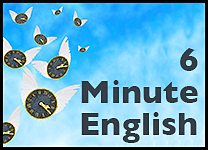Unit 26: English You Need
Exams, news, pronunciation, teachers' tips, learners' questions
Select a unit
- 1 English You Need
- 2 English You Need
- 3 English You Need
- 4 English You Need
- 5 English You Need
- 6 English You Need
- 7 English You Need
- 8 English You Need
- 9 English You Need
- 10 English You Need
- 11 English You Need
- 12 English You Need
- 13 English You Need
- 14 English You Need
- 15 English You Need
- 16 English You Need
- 17 English You Need
- 18 English You Need
- 19 English You Need
- 20 English You Need
- 21 English You Need
- 22 English You Need
- 23 English You Need
- 24 English You Need
- 25 English You Need
- 26 English You Need
- 27 English You Need
- 28 English You Need
- 29 English You Need
- 30 English You Need
Session 5
Learners' Questions
Welcome to Learners' Questions - the series where we answer your queries about the English language. What will this week's learner question be?
Activity 1
Learners' Questions
Though
Tamas from Hungary says: I'm a bit confused about using the word 'though'. Can you help me out and explain the usage of this word?
Watch the video and complete the activity

Dan
Hi guys! Dan here from BBC Learning English with this week's Learner Question. Find out what it is after this.
OK! This week's learner question comes from Tamas from Hungary, who says: I'm a bit confused about using the word 'though'. It's often used at the end of a sentence. For example: This house isn't very nice. I like the garden though. Can you help me out and explain the usage of this word? Tamas, I’d be delighted.
So, we normally think of 'though' as a conjunction introducing a sub-ordinate clause which contrasts with a main clause. It’s the less formal version of 'although' and 'even though'. And as conjunctions, all three sit at the beginning of the sub-ordinate clause. For example: Although she was very fond of him, she had no intention of marrying him. Even though she was very fond of him, she had no intention of marrying him. And, though she was very fond of him, she had no intention of marrying him. The poor guy!
However, in in your example, Tamas, 'though' is used as an adverb, and it is the less formal version of 'however'. 'Though' and 'however' can be used when we want to add a comment which contradicts or contrasts with something that has just been said. This is called an afterthought. For example: I’m sorry, I can’t stay for lunch. However, I’ll have a cup of tea. Or, I’m sorry, I can’t stay for lunch. I’ll have a cup of tea, though. Do you see?
Finally, let’s talk about 'as though'. Like 'though', 'as though' is a subordinating conjunction. We use it when we give an explanation of something which may not be correct. For example: It looks as though it’s going to rain.
I hope that answers your question Tamas. Thank you very much for writing to us. If anybody else out there has a question for Learners’ Questions, you can email us on: learning.english@bbc.co.uk. Please remember to put Learners’ Questions in the subject box and your name and where you’re writing from. We get a lot of emails from a lot of different people, guys, I’m afraid we can’t answer all of them, but we do read every single one. And for more information, you know where to go. Our website, bbclearningenglish.com. That’s it for this week’s Learners’ Questions. I’ll see you next time.
___________________________________________________________________
Did you like that? Why not try these?
___________________________________________________________________
Summary
Conjunction
Though is a conjunction of contrast. It connects a sub-ordinate clause to a main clause. It's less formal than though and even though. They all sit at the beginning of the clause.
Although she was very fond of him, she had no intention of marrying him.
Even though she was very fond of him, she had no intention of marrying him.
Though she was very fond of him, she had no intention of marrying him.
Adverb
Though can be an adverb. It is the less formal version of however. They can be used to add a contrasting comment as an afterthought.
I’m sorry, I can’t stay for lunch. However I’ll have a cup of tea.
I’m sorry, I can’t stay for lunch. I’ll have a cup of tea, though.
As though
As though is also a sub-ordinating conjunction. We use it when we give an explanation of something which may not be correct.
It looks as though it’s going to rain.
To do
Try our quiz to see what you've learned about this topic.
Learners’ Questions Quiz
4 Questions
Decide if these sentences are correct or incorrect
Help
Activity
Decide if these sentences are correct or incorrect
Hint
When 'though' is being used as a conjunction, where does it come in a subordinate clause?Question 1 of 4
Help
Activity
Decide if these sentences are correct or incorrect
Hint
'Though' is a conjunction or adverb of contrast. Do these two sentences agree or contrast?Question 2 of 4
Help
Activity
Decide if these sentences are correct or incorrect
Hint
When 'though' or 'however' are used as adverbs, where do they appear in the clause?Question 3 of 4
Help
Activity
Decide if these sentences are correct or incorrect
Hint
We use 'as though' when we give an explanation of something which may not be correct. Can this person know the future?Question 4 of 4
Excellent! Great job! Bad luck! You scored:
End of Session 5
Well, that's it for this unit! Join us again in Unit 27 for more Exam Skills, News Review, Pronunciation in the News, The Teachers' Room and Learners' Questions!
Session Vocabulary
Though
Can be a sub-ordinating conjunction
Can be an adverb
Less formal than although, even though and however


